

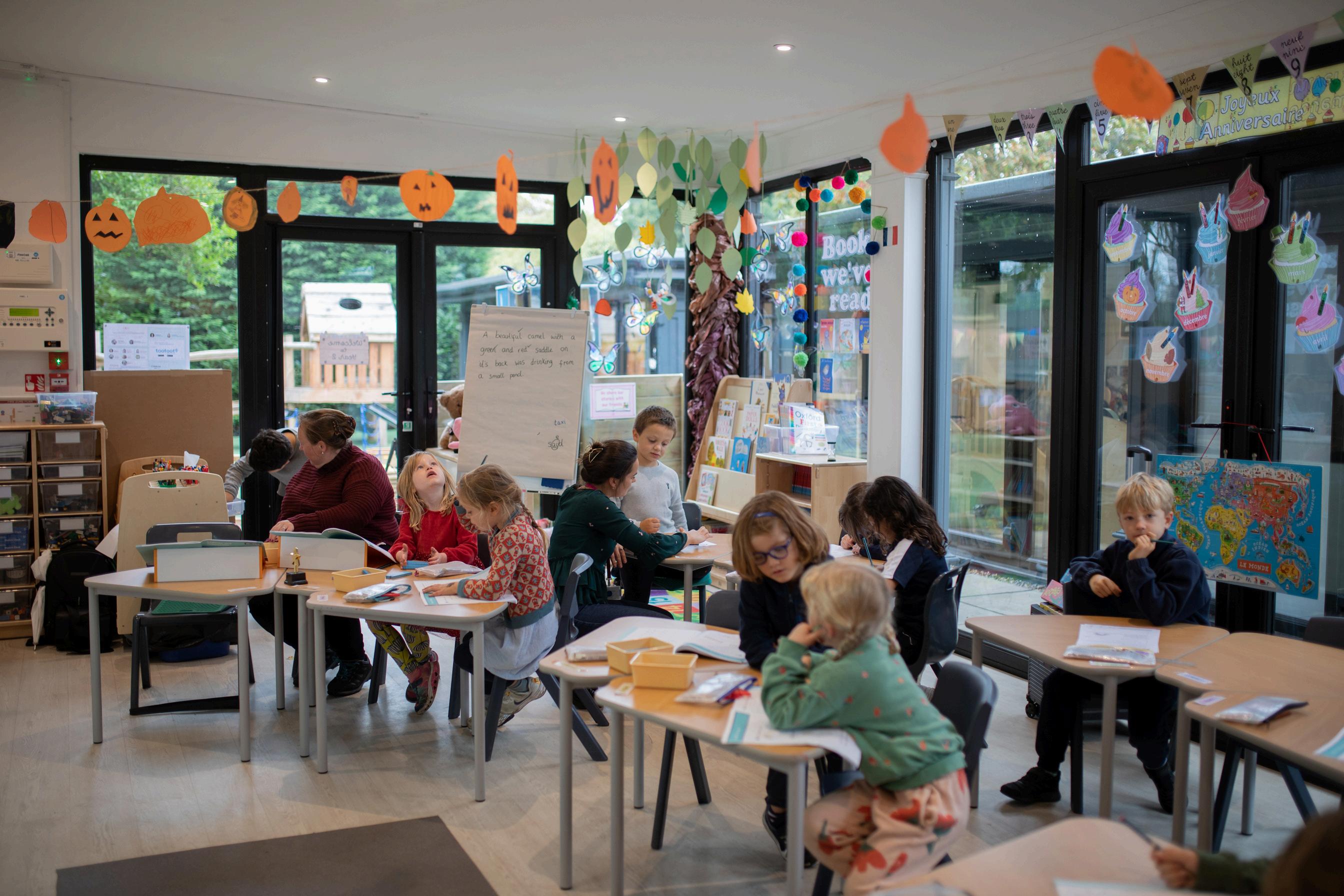










Hampton Court House Prep is about providing an educational experience centred around the child with bespoke approaches for every individual. Whether in classroom settings, extra-curricular activities or charity work, we teach the children to be well-rounded and caring and to contribute to all aspects of school life. Our day-to-day curriculum is one of the foundations of this approach. Lessons are designed to be interesting, engaging, supportive and challenging so that all children feel able to do their best. Teachers will always enable children to contribute fully to lessons, learn and demonstrate new knowledge, skills and ideas, and to shape their voice as part of a dynamic, but homely, community.
At Hampton Court House, our Years 1 – 6 curriculum is designed with the holistic development of each child in mind. We aim to cultivate a love for learning, curiosity, and confidence in our students. Central to our intent is the bilingual program for Years 1 – 4, where approximately 50% of the curriculum is delivered in French. This unique approach not only enhances language skills but also broadens cultural understanding and cognitive flexibility. Our goal is to support every child’s intellectual, social, and emotional growth through a rich and balanced curriculum where mistakes are accepted, and questions welcomed.
Our curriculum is implemented with a focus on creating an inclusive, engaging, and supportive learning environment with a sense of fun. For Years 1 – 4, the bilingual program integrates French into everyday learning, covering subjects such as humanities, science, sport and the arts in both English and French. This immersive approach helps students develop proficiency in both languages naturally and enjoyably, with in class support used to ensure all children are able to understand and access the curriculum. Lessons are structured to build on previous knowledge, ensuring a smooth progression. Within years 5 and 6 more specialist teachers are used to deliver the curriculum which allows for the development of skills necessary to start their secondary education in year 7. We employ a variety of teaching methods, including individual tasks, group work, and hands-on activities, to cater to different learning styles. Continuous assessment practices allow us to monitor each child's progress closely and provide personalised support as needed.
Impact
The impact of our carefully crafted curriculum is seen in the enthusiasm and active participation of our students. They develop strong foundation skills in literacy, numeracy, and science, along with the ability to think critically and solve problems. The bilingual program enhances their language skills and cultural awareness, giving them a broader perspective and improved cognitive abilities. Our students also grow in confidence, independence, and social skills. Regular assessments demonstrate enhanced academic progress and personal development, ensuring that students are well-prepared for the next stage of their education with a lifelong love of learning and a unique bilingual advantage.
Key contacts
Susie Byers Head of Prep sby@hchnet.co.uk
Eldon Fayers Assistant Principal | Teaching & Learning efa@hchnet.co.uk
Imogen Stone
Prep Head of Teaching & Learning ist@hchnet.co.uk
Nick Edwards Assistant Principal | Data & Assessment ned@hchnet.co.uk
Paul Pearce
Deputy Head | Operations & Academic pgp@hchnet.co.uk
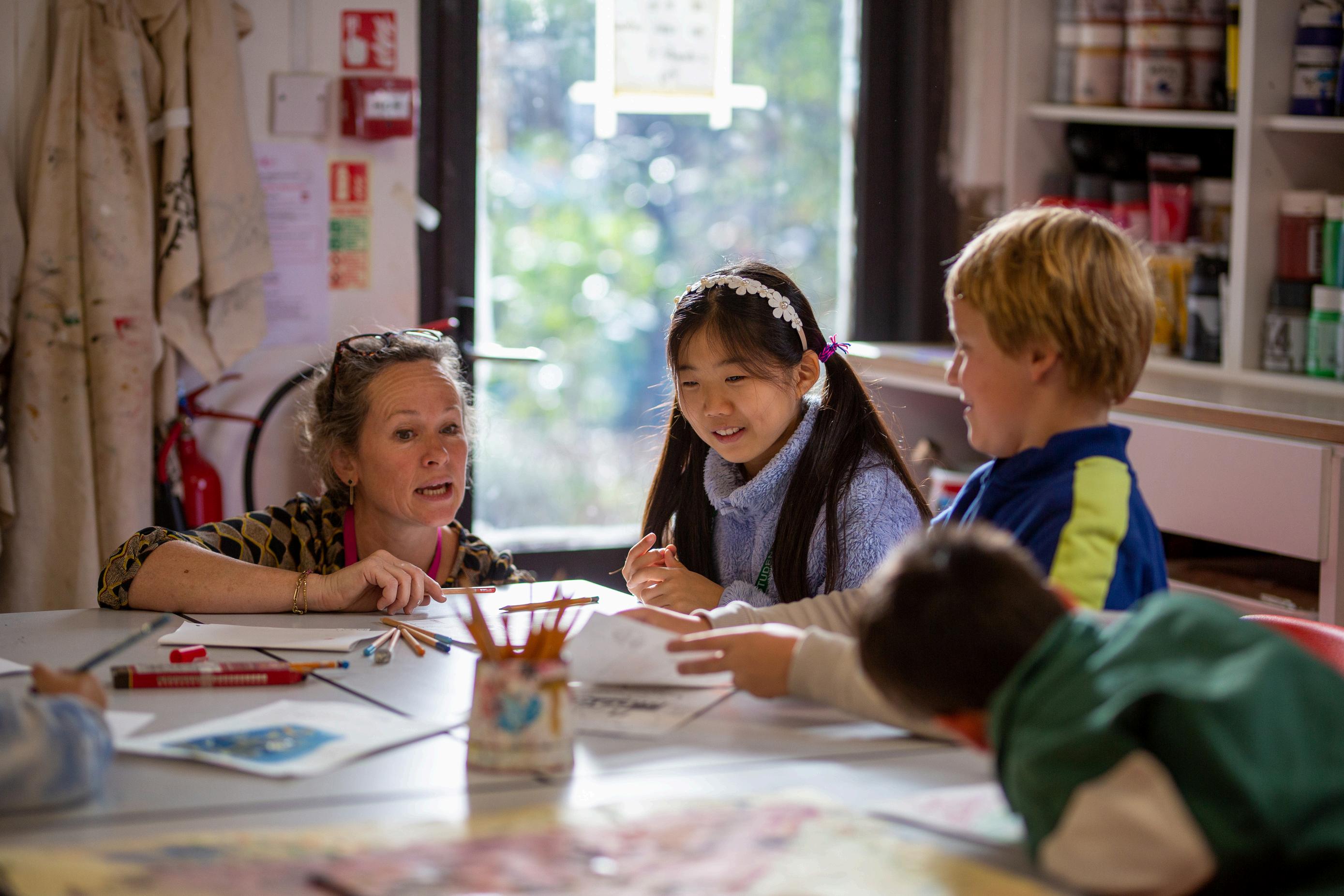

In a cross curricular project with English, Students will learn about the illustrator Gerald McDermott, to inspire art in response to the story of Anansi the Spider. This in turn, will inform the creation of African Kente cloth weaving, rich in colour and pattern. After half term, pupils will learn about composition and develop their drawing skills, looking at the art of Anthony Browne which accompanies their English text.
Term
Autumn 1
Autumn 2
Spring 1
Spring 2
Summer 1
Summer 2
What are we studying?
African masks: Studies of different parts of Sub-Saharan Africa and the different types of masks, detective skills in looking for clues in shape, pattern, texture, material Symmetry, drawing, printing, developing skills in papier mâché construction
African masks continued: Pupils will develop portraiture skills though follow up studies to the mask project, looking at artists who have been inspired by African masks, the Primitive art movement, Picasso, Matisse
Greek Myths: Learning about some of the Greek Myths, pupils will make art in response to the story of Theseus and the Minotaur, the Trojan Horse, the Twelve Labours of Hercules
Romans: Pupils will learn about the importance of Roman pottery and use clay to make a traditional Roman game and a pot inspired by the Roman face pots discovered throughout the UK by archaeologists
Textiles: Weaving Pupils will learn about the work of illustrator Gerald McDermott to inspire colour and pattern Learning about the symbolism of African Kente cloth, pupils will create their own paper weaves
Drawing / painting: Pupils will look at the work of Anthony Browne to inspire drawings and paintings which represent animals in captivity

This term Year 4 will discover the Roman Empire and the mysteries behind it as well as how children are living around the world and capitals.
History
The pupils will learn about the Roman Empire: when and how the Romans conquered Britain, key facts about the invasion of Britain, why Romans built new roads in Britain and how/where. They will also learn who Emperor Hadrian was and how he built a wall. Finally, they will discover Romans’ religious beliefs and the gods/goddesses they worshipped.
Geography
In Geography, they will read and discover how children are living around the world through the book “children just like me”, “des enfants comme moi”. Then the children will talk about them and make a ten-minute individual presentation. Presentation should include, geography features, language, food, traditions…
Finally, the children will also have to learn and remember capitals for the Geography Contest competition.
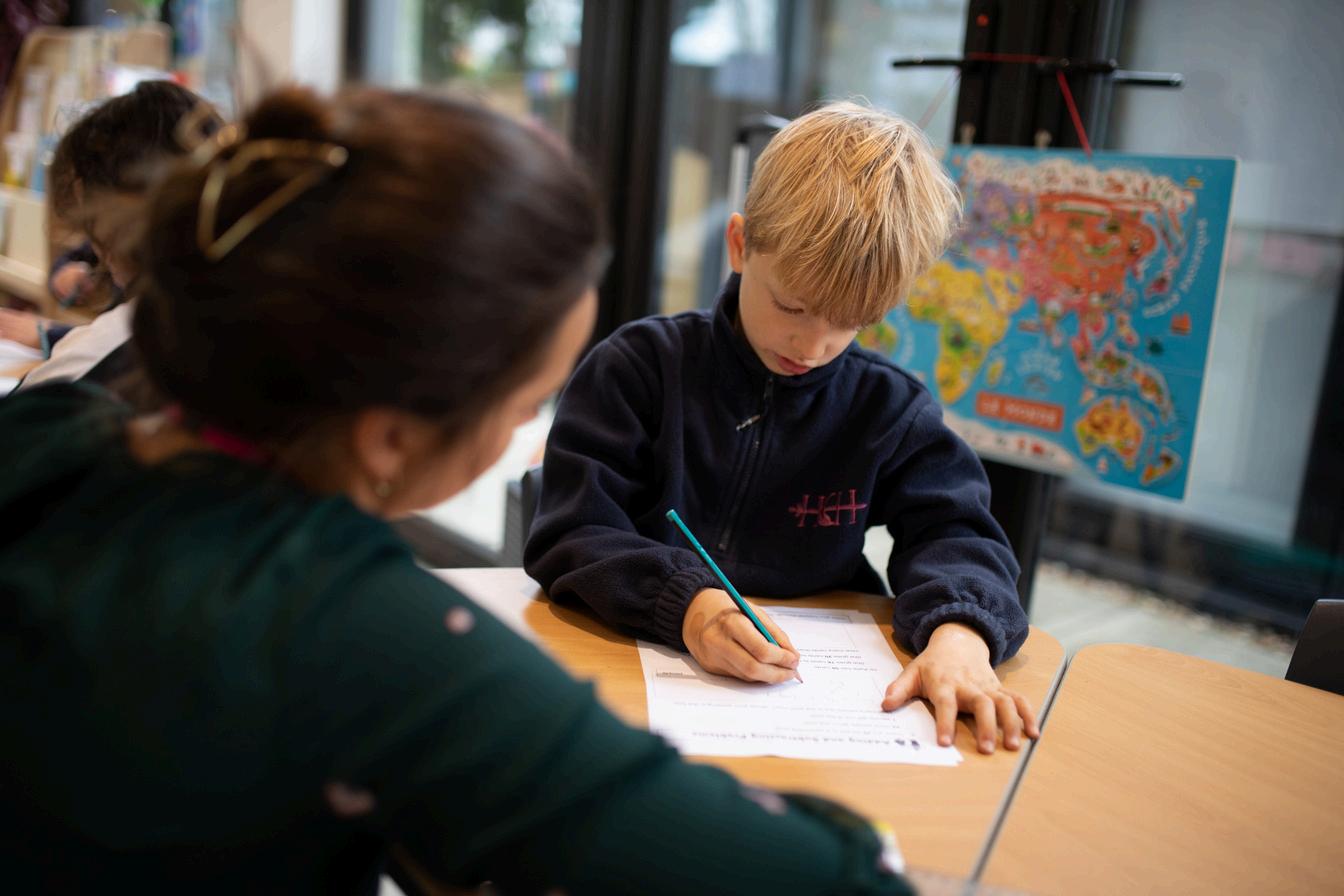

Term
Autumn 1
Autumn 2
Spring 1
What are we studying?
We will discover the Ancient Greek civilisation and their myths. We will discover geographical similarities and differences through the study of human and physical geography of a region of the United Kingdom, a regional differences in Europe and North and South America. We will identify the position of and explore the significance of latitudes, longitudes, the equator, the northern hemisphere, and the southern hemisphere.
We will discover the Olympic games and their origins and the associated Olympian Gods. We will explore the world’s countries, using maps to focus on geographical areas of interest in Greece, Germany and Italy, as well as exploring their human geography.
Learn about Ancient Greece: artefacts, the way of life in Ancient Greece and the development of democracy. We will talk about the difference between Sparta and Athens.
Spring 2 In Geography, we will learn about the weather forecast and climates as well as natural disasters.
Summer 1
Summer 2
We will learn key facts about the invasion of Britain, why Romans built new roads in Britain and how/where, who Emperor Hadrian was and how he built the wall defending the northernmost point of the Roman Empire. Pupils will make presentations on the geographical knowledge they have learnt.
Using the graphic novels ‘Asterix and Obelix’ by Goscinny and Uderzo to talk about: Alesia, druids, menhirs, the Roman army, Roman Gaul (France) and Roman monuments. Pupils will compare feature between the Roman and civilisation of the Gauls.

Year 4 Curriculum Overview
The Summer Term begins with an investigation of a range of traditonal stories from Africa. Year 4 will look at Ananse Stories and understand the morals and teaching behind each tale. Children will continue to practise extending sentences using a range of devices and will write their own African inspired stories incorprating sophisticated vocabulary and punctuation.
Year 4 then move onto exploring issues concerning animals in captivity, reading texts including Zoo by Anthony Browne and Rainbow Bear by Michael Morpurgo. The aim is to be able to write a persuasive text using adverbials and expanded noun phrases. Just before the May half term the children will look at poems for everyday of the year – we will be using the gorgeous book, ‘I am the Seed that grew into a Tree : A Nature Poem for Everyday of the Year’. Year 4 will compare and analyse a variety of poems; study fronted adverbials and possessive apostrophes.
The final half term of Year 4 begins with reading Michael Morpurgo’s The Butterfly Lion. This is a sensitive book with a range of historical references. The children will discuss , compare and analyse the content, plot and character with reference to the background story of WW2. Children will write another chapter for the book – hopefully we could send them to Michael Morpurgo and see what he thinks!
We then have a unit based on recounts and biographies – investigating the style of writing in ‘Henry’s Freedom Box’ and the biography’ ‘Who was Rosa Parks?’. Year 4 will explore the use of dialogue punctuation, apostrophes and cohesion in paragraphs.
Our final topic is a poetry unit – the children will enjoy reading, learning and performing some fantastic poems from the anthology, ‘Off by Heart- Poems for YOU to Remember’.
How it will be assessed
Assessment will be through daily marking and feedback Through discussion and questioning At the end of each unit the children will be writing in the style of the author or poet they have been reading There will also be informal assessment of writing, reading and SPaG at the end of each term

Term
Autumn 1
Autumn 2
Spring 1
Spring 2
Summer 1
Summer 2
What are we studying?
Read a range of fables (Rosen's Aesop's Fables) explore dialogue through drama, debate moral messages and write letters using extended sentences. Finally, children write fables. Get creative with The Usborne Complete Book of Art Ideas, exploring instructions & explanations. Study possessive apostrophes and pronouns. Invent and introduce an art machine. Cats and Dogs – explore narrative poems.
Read the hilarious How to Train Your Dragon, exploring plot, character, setting & style. Study pronouns, dialogue punctuation and adverbials. Write a new chapter.
Amazing architecture, world landmarks and influential architects inspire this block. Using Cool Architecture (Simon Armstrong) as a starting point, read and write stimulating reports. Revise extending sentences with conjunctions and use apostrophes for possession.
Read, discuss, learn and perform some fantastic poems from the Puffin Book of Utterly Brilliant Poetry.
Use versions of Princess and the Pea to explore, compare and write fairytales with a twisted point of view. Study dialogue, tense, pronouns. Role-play, write and perform playscripts. Explore recounts through Little Mouse’s Big Book of Fears (Emily Gravett), After the Fall (Dan Santat),The Dark (Lemony Snicket). Study adverbials and possessive apostrophes. Poetry – List poems, kennings. Explore devices such as similes, alliteration and onomatopoeia.
Using rainforest stories, explore the issues confronting indigenous peoples and the environment. Create own stories and learn to correctly use the perfect form and paragraphs.
Read Wolves in the Walls (Gaiman) and Wolves (Gravett) for features of non-chronological reports. Use adverbs, prepositions and conjunctions of time/cause. Produce reports.
Explore narrative poems – You wait Till I’m older by Michael Rosen and other poems in The Works chosen by Paul Cookson.
The children will enjoy a collection of wonderful stories from Africa - Mufaro’s Beautiful Daughters, The Pot of Wisdom and African Tales. Write Ananse stories using extended sentences. Explore issues around animals in captivity, reading texts including Zoo by Anthony Browne and Rainbow Bear by Michael Morpurgo. Study adverbials and expanded noun phrases. Using the lovely book ‘ I am the Seed that Grew the Tree’ Year 4 will enjoy reading and choosing poems, comparing and analysing, then writing. Study fronted adverbials and possessive apostrophes, all in the context of a poem for every day of the year.
Read The Butterfly Lion over the course of several days, using the opportunity to discuss, compare and analyse it. Perform role-play, write dialogue, use adverbials, and finally produce a new chapter for the book. Explore recounts using biographies from the civil rights movement: Henry’s Freedom Box and the story of Rosa Parks' life. Use dialogue punctuation, apostrophes and paragraphs.

Year 4 Curriculum Overview
The children will be learning from a textbook called ‘Passe-Passe 3’ which breaks down the content into six different units This book offers a very active type of learning with many opportunities for children to learn through games, songs, movements and art. This multi-sensory approach allows children to communicate and grow as they are learning a new language.
The four skills (reading, writing, listening and speaking) will be alternatively assessed. There will be a test at the end of each unit for all the skills except speaking that is carried out as a formative assessment throughout the year. There will be vocabulary and French spelling tests weekly.
Term
Autumn 1
Autumn 2
Spring 1
Spring 2
Summer 1
Summer 2
What are we studying?
This term, the children expanded their language skills through a combination of Passe-Passe 2 and Passe-Passe 3. In Autumn 1, they practiced French greetings and began using -er verbs in the present tense. They explored how to describe their family using possessive adjectives such as mon/ma, ton/ta, and son/ses.
The children also reviewed colours and analysed a poem featuring similes involving colours, which enhanced both their vocabulary and their creative expression. They learned to describe pet animals, focusing on proper adjective agreements, and explored vocabulary related to school subjects.
Building on their progress in Autumn 1, the children explored vocabulary related to different jobs and school objects. They had their first introduction to the conditional tense when learning how to express aspirations, using phrases such as je voudrais être (I would like to be). They also learned how to describe their school day using reflexive verbs. To conclude the term, the children developed their writing skills by creating Christmas cards in French, which helped consolidate their learning in a festive and creative way.
Building on their learning from Autumn, the children will focus on practical language skills and cultural knowledge. They will learn how to state a person’s place of origin and nationality, incorporating vocabulary for countries, cities, and nationalities. They will practice asking about and discussing schedules and times, learning how to tell the time in French (l’heure). Additionally, they will work on expressing their needs and asking for permission using phrases such as je veux and est-ce que je peux. The children will also explore vocabulary related to sports, enabling them to discuss their interests and activities. Throughout the term, the children will complete weekly spelling tests to reinforce key vocabulary, and their progress will be assessed with an end-of-term assessment.
In Spring 2, the children will continue to expand their skills with new concepts and vocabulary. They will develop the ability to describe clothing in detail, focusing on key vocabulary and adjectival agreements. They will learn how to give directions using the imperative form and will practice talking about their daily habits and routines, incorporating reflexive verbs and time expressions to describe regular activities. As in Spring 1, there will be weekly spelling tests to reinforce learning, culminating in an end-of-term assessment to evaluate their progress.
In Summer 1, the children will explore the language needed for shopping and ordering food, practicing phrases such as "Je voudrais..." (I would like...) and "Combien ça coûte?" (How much does it cost?). They will also learn vocabulary related to food and drink, enhancing their ability to engage in real-world interactions. Additionally, they will focus on expressing preferences using "j'aime," "je déteste," and "je préfère." The children will continue developing their listening and speaking skills through role-play activities.
In Summer 2, the children will consolidate their learning through storytelling and project-based activities. They will explore famous French tales and fables, enhancing their reading comprehension and creative writing in French. The children will also learn how to describe holiday activities and future plans using the near future tense (aller + infinitive). As with previous terms, weekly spelling tests and an end-of-term assessment will help monitor their progress and reinforce key learning objectives.

Year 4 Curriculum Overview
As part of their learning, pupils will develop their reading and writing comprehension skills through the study and creation of poems. They will also explore irregular plural nouns and deepen their understanding of word classes (verbs, adjectives, nouns, and determiners). Expanding their specific vocabulary and learning to identify the structure of a text will further enhance their literacy skills. Additionally, they will engage with literary texts to improve their reading comprehension, while working on synonyms and grammatical homophones. Writing practice will focus on creating a structured and coherent story, and for recitation, they will study "Écrire à tout venant".
Students will be asked to write and present two book reviews this term: 12th May and 23rd June.
Autumn 1
Spring 1
Compréhension et production écrites : le texte documentaire
Ponctuation
Orthographe : mots invariables
Conjugaison : situer une phrase dans le temps
Récitation : Réunion de famille
Autumn 2
Compréhension et production écrites : le récit
Production écrite : inventer une histoire en s’inspirant d’un texte
Identifier le verbe conjuguéConjuguer ‘avoir’ et ‘être’ au présent
Les pronoms sujets et groupes nominaux
Récitation : La Grenouille aux souliers percés
Summer 1
Compréhension et production écrites : la recette de cuisine
Les terminaisons à l’imparfait, au présent et au futur
Les familles de mots
Récitation : Les Hiboux
Compréhension et production écrites : le poème
Le pluriel irrégulier de certains noms
La classe des mots (verbe, adjectif, nom, déterminant)
Comprendre des mots du lexique spécifique
Identifier la structure d’un texte
Spring 2
Summer 2
Compréhension et production écrites : la lettre et le texte théâtral
L’accord de l’adjectif
Les groupes nominaux
Récitation : Le Corbeau et le Renard
Compréhension écrite : Textes littéraires
Les synonymes - Les homophones grammaticaux
Écrire une histoire structurée et cohérente
Récitation : Écrire à tout venant
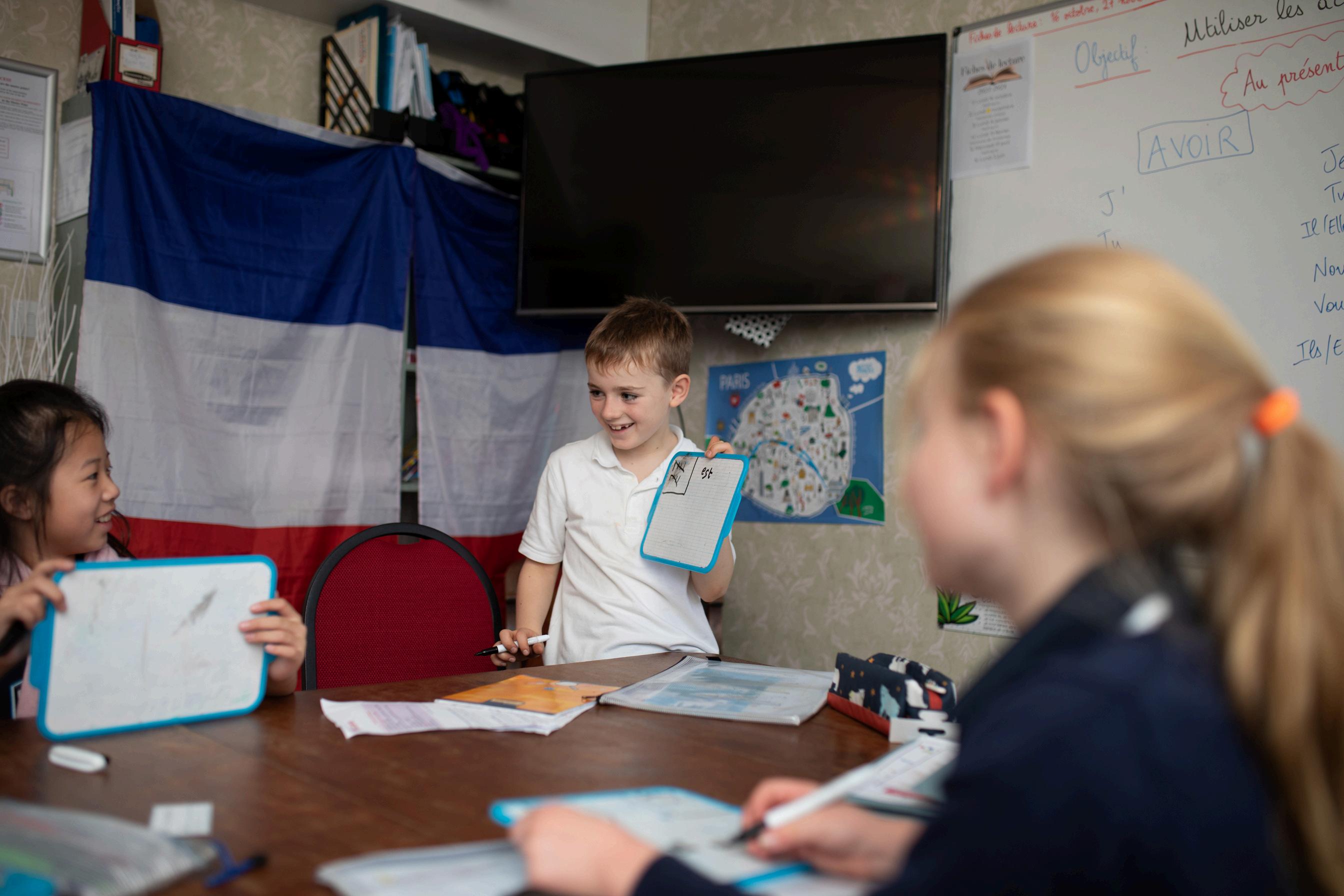

In the Summer term, Year 4 will broaden their understanding of French culture by exploring its influence in African countries. We will begin by discovering la fête du 1er mai as celebrated in countries like Senegal and Ivory Coast, where workers’ rights are honored with parades and speeches.
We will discover the influence of music and dance, from the lively rhythms of zouglou in Côte d'Ivoire to the powerful beats of sabar drumming in Senegal, to celebrate La Fête de la Musique, where African artists showcase their talents, where music plays a central role in daily life and bring communities together.
Year 4 will discover Kirikou et la Sorcière, a beloved animated film by Michel Ocelot that brings African storytelling to life. Through Kirikou’s adventures, students will explore themes of bravery, wisdom, and community, which are deeply rooted in African oral traditions. They will learn how storytelling plays a vital role in passing down values and history, much like fables by Jean de La Fontaine in French literature. By comparing these traditions, students will gain a deeper appreciation of how storytelling connects French and African cultures, highlighting their shared heritage and influences.
The term will conclude with a look at le 14 juillet and its impact in former French colonies, as well as the independence celebrations of Francophone African nations such as Senegal or the Democratic Republic of Congo. We will explore how these countries mark their national days with parades, traditional dances, and musical performances, reflecting on their history and cultural identity.


In the first half term the pupils will learn about:
Rounding numbers
Negative numbers in temperature
Roman numerals
Measure in m, cm, and mm
Use SI units
Construct bar charts
Consolidate knowledge of decimal and fraction equivalents
Factors and multiples
Applying formal methods to multiplication problems
How it will be assessed
In the second half term the pupils will learn about:
Areas and perimeters of rectilinear shapes
Applying formal methods to addition and subtraction problems
Further equivalent decimals and fractions
A written assessment covering the subjects that have been studied in that term. In addition, informal oral assessment takes place in lessons throughout the term to consolidate and assess depth of understanding.
What are we studying?
Place value of 3 and 4 digit numbers
Autumn 1
Addition and subtraction
Telling the time
Drawing line graphs
Fractions – evaluating equivalent fractions
Factors and multiples
Drawing circles and polygons
Plotting co-ordinates
Spring 1
Consolidation of knowledge of 1 place decimals
Equivalent decimals and fractions
Multiply and divide decimals by powers of 10
Autumn 2
Spring 2
are we studying?
Calculating with powers of 10
Mental addition and subtraction
Doubling and halving
Grid multiplication Division
Adding money using column addition
Addition and subtraction of decimals
Multiply multiples of 10, 100, and 1000
Division - “chunking” with remainders
Lines of symmetry
Types of angles
Properties of polygons
Summer 1
Rounding numbers
Negative numbers in temperature
Roman numerals
Measure in m, cm, and mm
Use SI units
Construct bar charts
Consolidate knowledge of decimal and fraction equivalents
Factors and multiples
Applying formal methods to multiplication problems
Summer 2
Areas and perimeters of rectilinear shapes
Applying formal methods to addition and subtraction problems
Further equivalent decimals and fractions
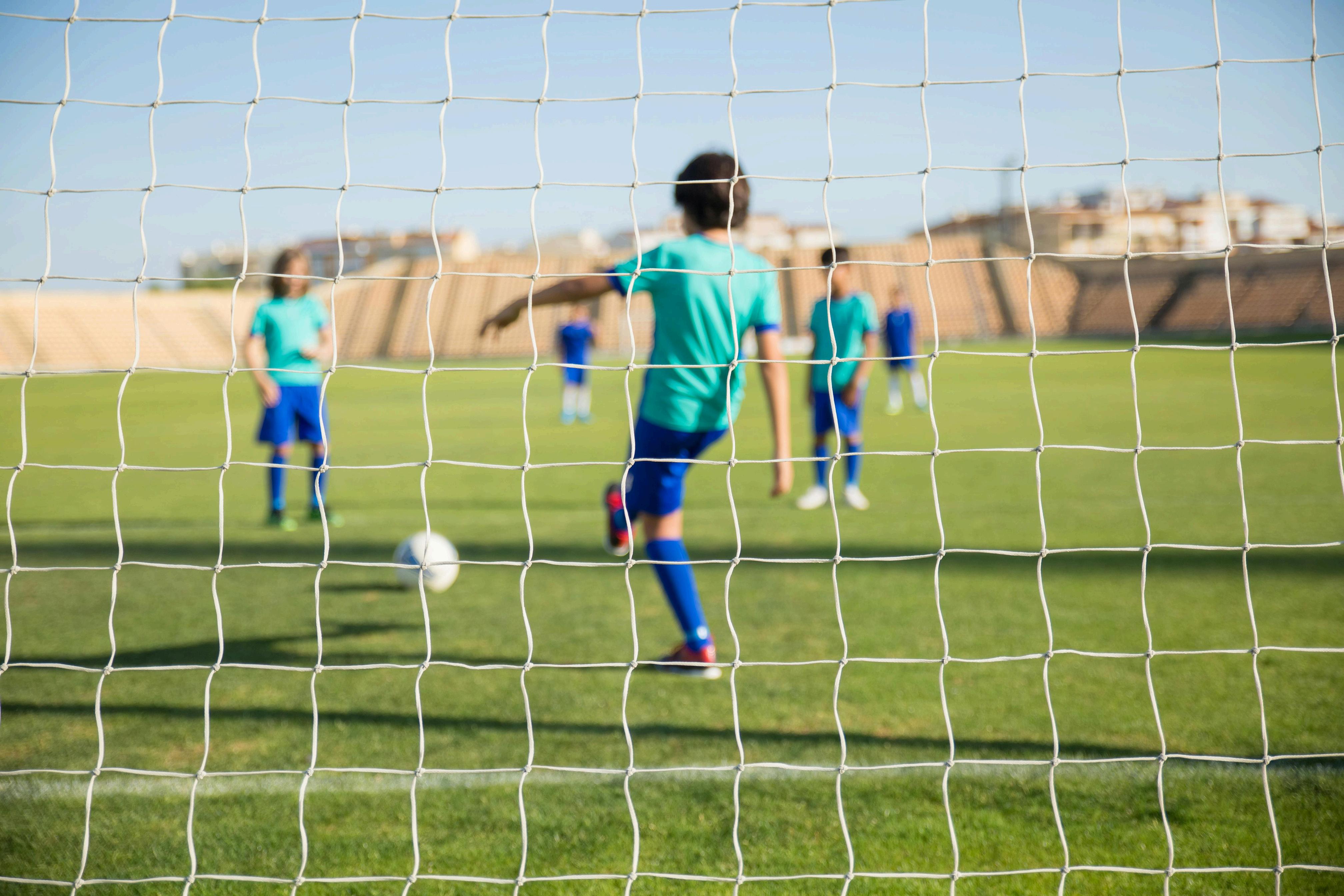

IIn the Summer Term of 2025, Year 4 students will focus on outdoor activities during their PE lessons to improve their athletics skills. The aim is to help them enjoy, participate in, and succeed in athletics, leading up to a Sports Day in the final half term.
Students will learn basic techniques for running, jumping, and throwing, as well as the simple rules for each event. They will understand the differences between shortdistance sprints and longer-distance running and the skills needed for each. Teaching will include both individual and team activities, like relay races.
Students will also play cricket and learn important skills in bowling, batting, and fielding. We encourage students to have fun in sports and lead an active lifestyle. They will focus on setting and reaching personal goals related to their performance, such as timings and distances. We will promote competition and fair play throughout the lessons.
Term
Autumn
Spring
Summer
What are we studying?
Football: passing, shooting, dribbling, conditioned games
Netball: passing, shooting, attack vs defence, positions and conditioned games
Games: balance, coordination, agility, stuck in the mud, octopus tag, capture the flag
Gymnastics: balances, body shapes, travel, jumps and rolls
Hockey: passing, shooting, dribbling, conditioned games. Benchball: throwing, catching, positions and attack vs defence
Cricket: throwing, catching, batting, bowling and fielding
Athletics: shuttle relay, 60m sprint, 200m sprint, hurdles, long jump, javelin throw and shot-put throw
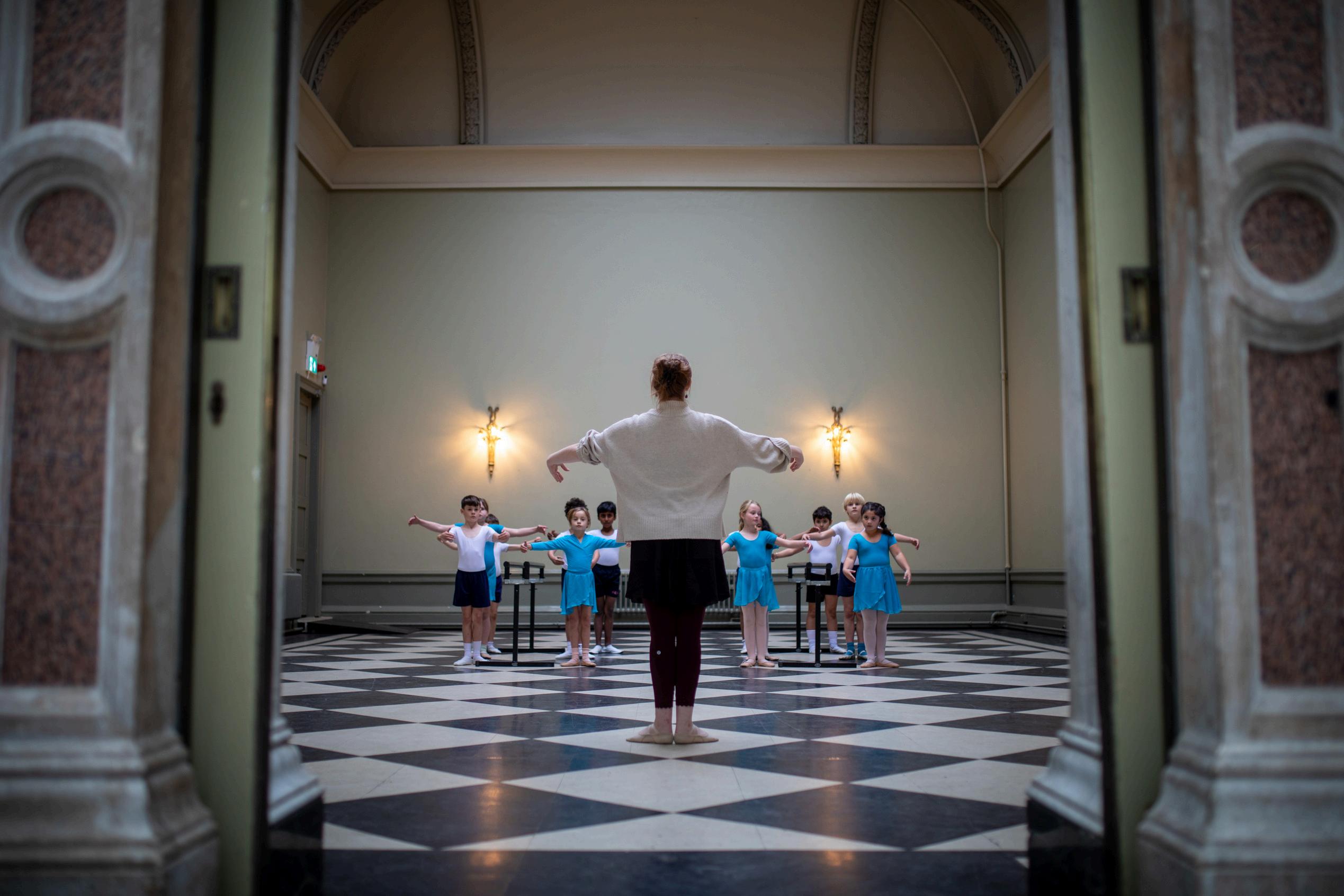

Year 4 Curriculum Overview
This term students in year 1 – 4 will be preparing for their showcase on the 12th June around the theme of Fairy Tales.
Throughout the year, there will also be numerous recitals and concerts, providing students with platforms to display their musical abilities and talent.
At Hampton Court House, we believe that the performing arts are integral to our school community. Therefore, students will actively participate in various performances throughout the year. These performances form the backbone of our curriculum. We are committed to offering inclusive opportunities that allow every student to showcase their talents.
To prepare for these performances students will focus on developing spatial awareness, musicality, vocal, physical, and character skills to enhance their performance abilities. They will learn stage craft and understand how to engage an audience.
Additionally, we place a strong emphasis on collaborative and creative skills, which are essential for every child's growth. Our classes incorporate engaging games and activities designed to foster teamwork, improve peer interaction, and develop the ability to follow directions. Students are encouraged to contribute creative suggestions through music, movement, and dialogue, ensuring a wellrounded arts education at Hampton Court House.
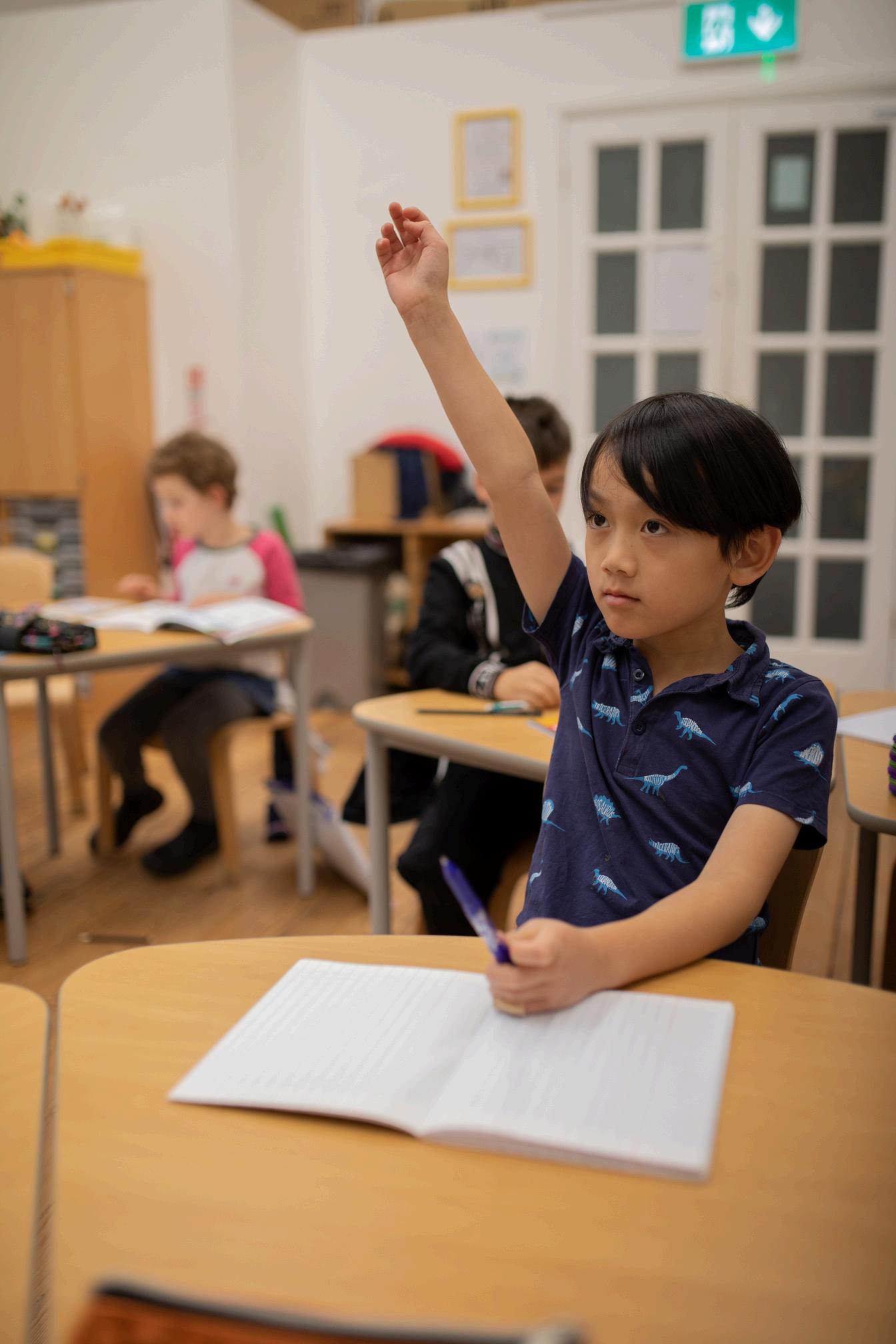

In the first half of the summer term, we will be focusing on the Healthy Me topic, in which we will discuss healthy eating and healthy choices, having a balanced diet and being physically active. We will also look at how to be a good friend and finish with how to deal with difficult situations.
In the second half term we will explore the Dreams and Goals topic. Within this we will look at how to stay motivated when facing challenges and persevering through difficulties. We willalso look at working positively with other people and the importance of having a positive attitude. We will finish with how to work hard to achieve our own dreams and goals, and help others achieve theirs.
As always, our PSHE is delivered with a mindful approach, giving plenty of time for thinking, discussing and reflecting. The lessons are delivered in an age-appropriate way and all resources are available to parents in advance upon request.
How it will be assessed PSHE lessons are predominantly discussion based, with some written tasks for deeper comprehension and application. At the end of each lesson, the students will complete self-reflection sheets for teachers to monitor understanding and adapt future teaching. Teachers keep track of the students’ levels and understanding of the different elements of PSHE across the year.
What are we studying?
Autumn 1
Being Me in my World: Becoming a class ‘team’ Being a school citizen Rights, responsibilities and democracy Rewards and consequences
Relationships: Jealousy Love and loss
Spring 1
Autumn 2
Spring 2
Memories Getting on and falling out Girlfriends and boyfriends
Healthy Me: My friends and me
Group dynamics
Summer 1
Smoking Alcohol Healthy friendships
Summer 2
Celebrating Difference: Judging by appearances Understanding influences Understanding bullying Problem solving Special me
Changing Me: Unique me Having a baby Girls and puberty Changes
Dreams and Goals: Hopes and dreams Broken dreams Overcoming disappointment Creating new dreams Achieving goals

In the first half term we will study Sound.
In this capacity we will focus on:
Identifying how sounds are made, associating some of them with something vibrating 1
Recognising that vibrations from sounds travel through a medium to the ear 2
Discussing the patterns between the pitch of a sound and features of the object that produced it 3
Finding patterns between the volume of a sound and the strength of the vibrations that produced it 4
Explaining how sounds get fainter as the distance from the sound source increases 5
In the 2nd half term we will study Living Things and their Habitats.
In this capacity we will focus on:
Living things and their habitats 1
Recognise that living things can be grouped in a variety of ways 2
3
Explore and use classification keys to help group, identify and name a variety of living things in their local and wider environment
How it will be assessed
Pupils will be assessed on ½ termly tests to determine understanding and misconceptions
Then in the Summer Term the pupils will be assessed on the years ’ work to evaluate knowledge and understanding
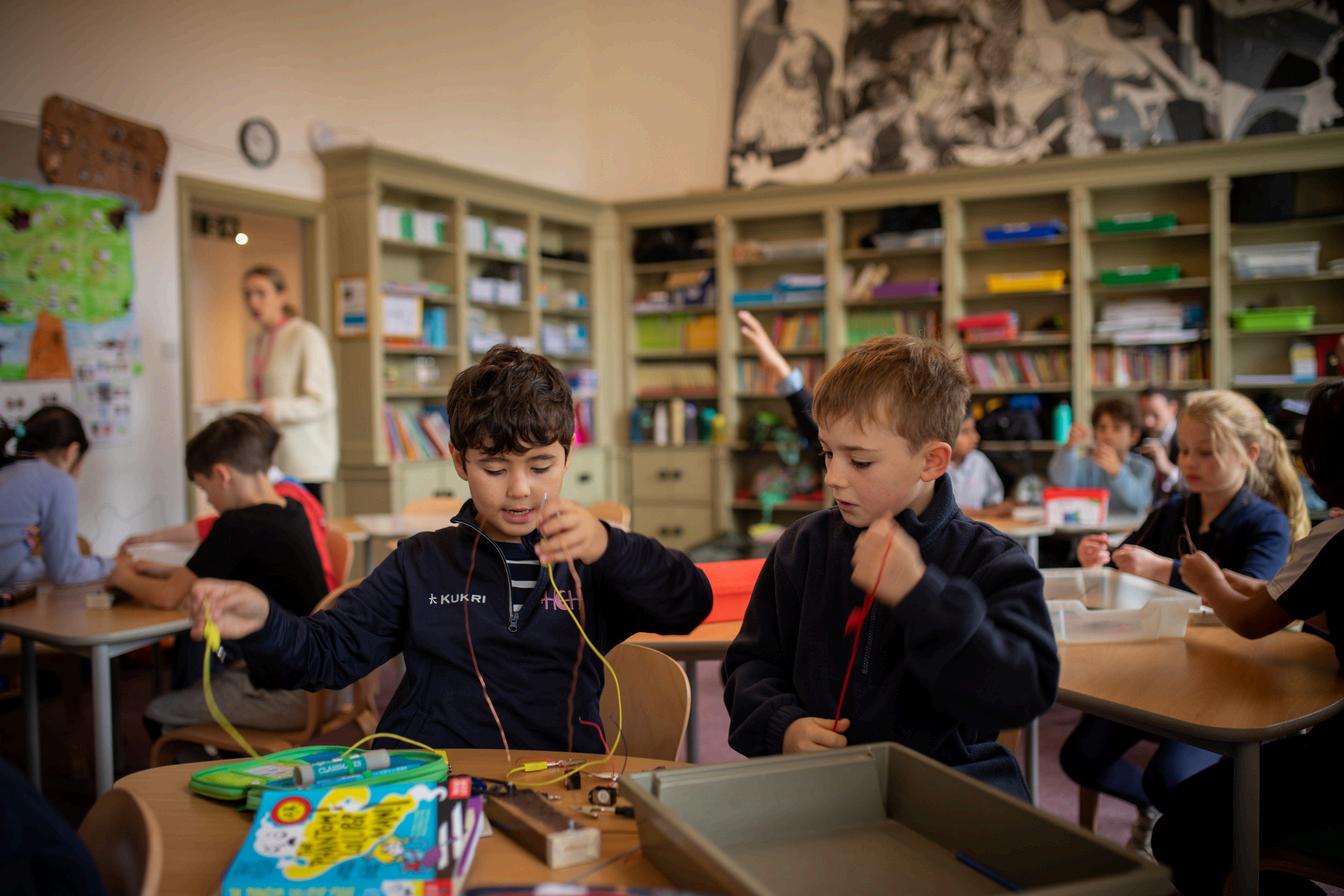

Term
Autumn 1 Electricity
Autumn 2 States of Matter
Spring 1 Animals - including Humans
Spring 2 Living Things and their Habitats
Summer 1 Sound
Summer 2 Classification of Living Things
Year 4 Curriculum Overview
What are we studying?
